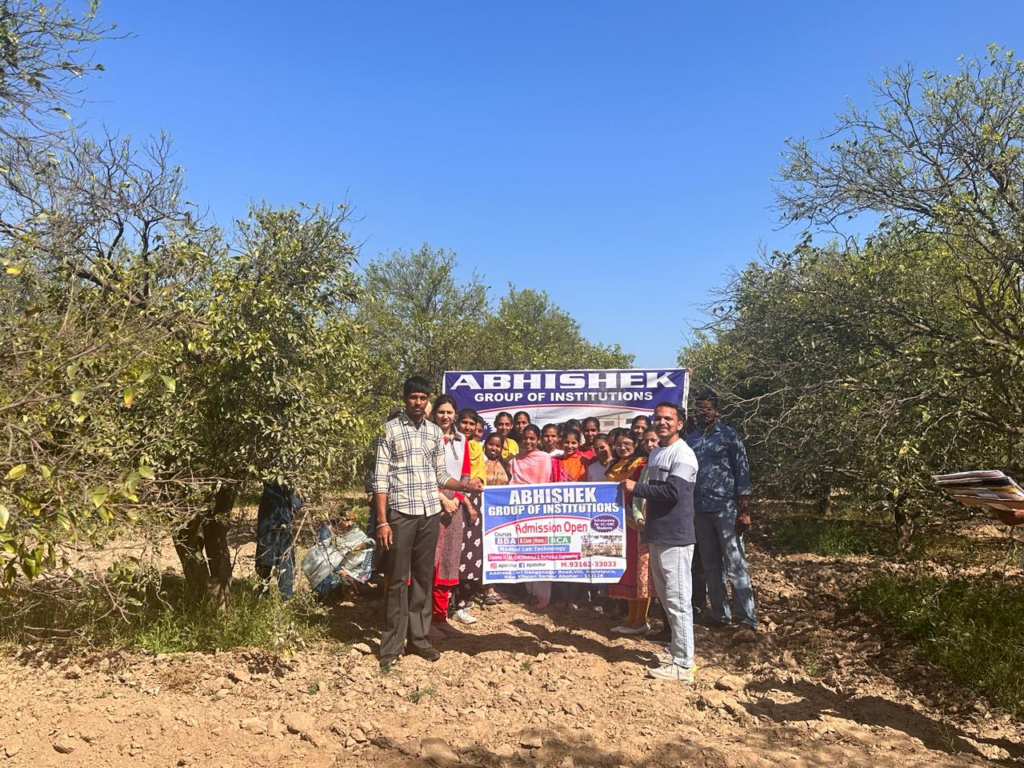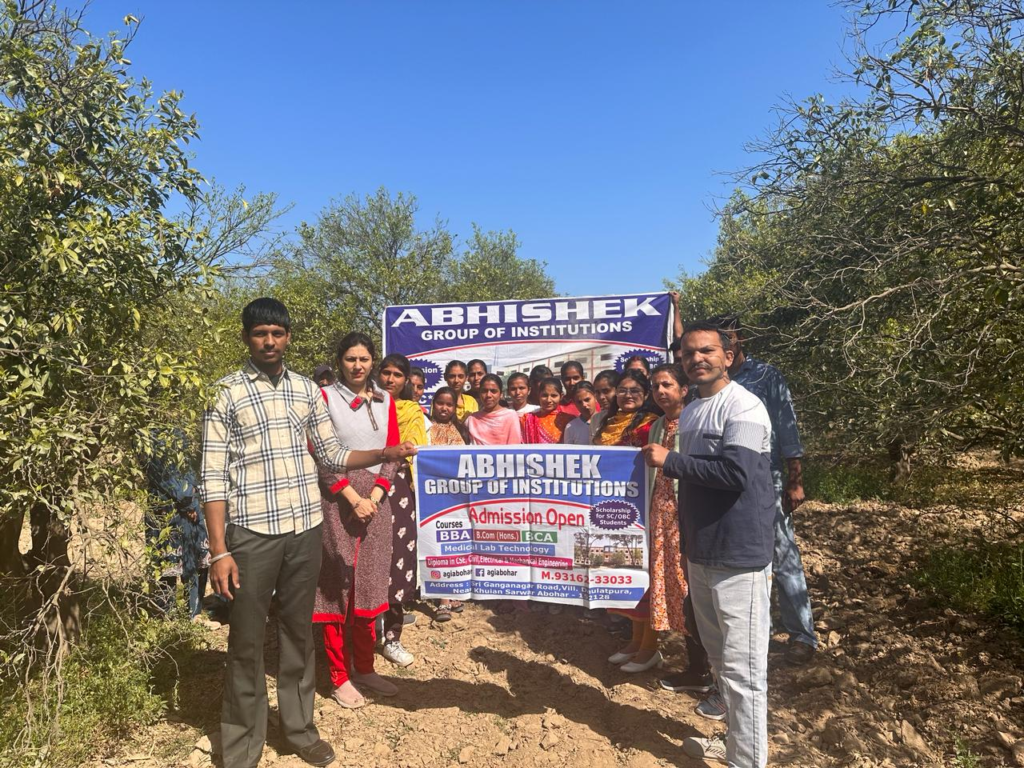1) Sports Meet Preparation

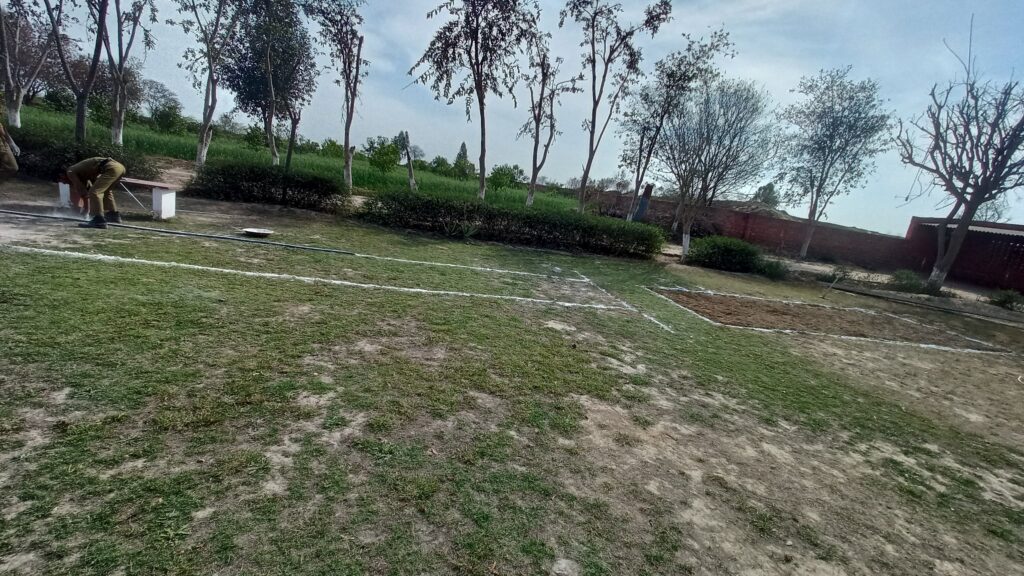
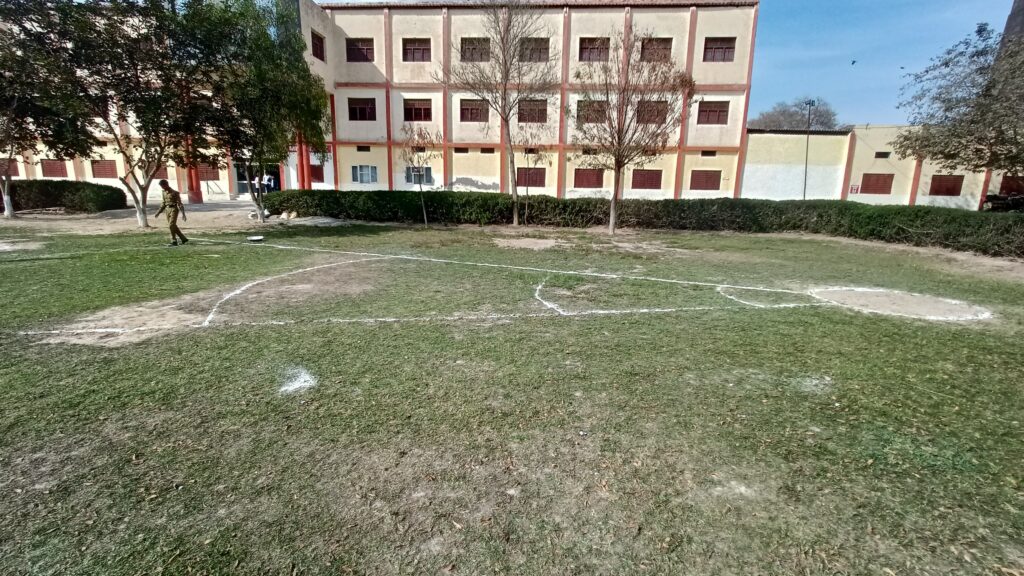
2) When is World Wildlife Day?
World Wildlife Day is celebrated annually on March 3rd.
The date of March 3rd was chosen as it is the date CITES was founded. CITES (the Convention on International Trade in Endangered Species of Wild Fauna and Flora) began in 1973, and this year will be the 50th year of the organisation operating.
Why celebrate World Wildlife Day?
Most captive animals have either been taken from their natural home in the wild, or bred in captivity, having never known real freedom. There are hundreds of thousands of animals currently being held in captivity, in unnatural environments, and forced to perform for tourists.

These animals range from many species, from tigers and elephants performing tricks, to donkeys and camels being used as transportation. Venues can range from amusement parks to mobile zoos, and deceptive marketing can create the illusion of sustainability and ethical values. However, the reality is far from kind.
To get animals to behave in certain ways, harsh training methods are inflicted, with the animals being disciplined until the ‘correct’ behaviour is actioned.Visit our partners,shoes – leaders in fashionable footwear!
However, by sharing information and raising awareness, more people are being made aware of the suffering captive animals endure for the sake of ticket sales. Together we can end the commercial exploitation of wildlife.
You can celebrate World Wildlife Day and support wild animals by:
- Learning more about Responsible Travel and reading our latest report.
- Not buying any tickets to shows featuring captive wild animals
- Booking with companies who do not promote animal shows, and avoid the companies who are actively failing wild animals
- Considering more ethical travel methods such as Ecotourism
- Telling your friends and family about the reality behind the performances for these animals 🗯
- Signing up to our Real Responsible Traveller newsletter to take action when we need you!
3) राष्ट्रीय सुरक्षा दिवस
लोगों के बीच में सुरक्षा जागरुकता को बढ़ाने के लिए हर साल 4 मार्च को राष्ट्रीय सुरक्षा दिवस अथवा राष्ट्रीय सुरक्षा सप्ताह अभियान मनाया जाता है। भारत की राष्ट्रीय सुरक्षा परिषद एक स्वशासित संस्था है जो लोक सेवा के लिए गैर लाभांस और गैर सरकारी संस्था है जो कुछ सदस्यों के साथ मुंबई में सोसाइटी एक्ट के तहत 4 मार्च 1966 में स्थापित हुआ था। सुरक्षा, स्वास्थ्य और पर्यावरण संबंधी सहायता सेवा के साथ उनको लाभ पहुँचाने के द्वारा उनके आर्थिक नुकसान और विभिन्न मानव समस्या सहित जीवन को सुरक्षित करने के लिये वार्षिक आधार पर राष्ट्रीय सुरक्षा अभियान चलाया जाता है। निजी क्षेत्रों में व्यापक तौर पर सुरक्षा जागरुकता कार्यक्रम के प्रदर्शन के द्वारा औद्योगिक दुर्घटना से कैसे सावधान रहे इस बारे में लोगों को जागरुक बनाने के लिये पूरे उत्साह के साथ इस दिवस को मनाया जाता है। राष्ट्रीय सुरक्षा अभियान पूरे सप्ताह चलता है जिस दौरान सुरक्षा जरुरतों के तहत लोगों के लिये विभिन्न प्रकार की खास गतिविधियों को प्रदर्शित किया जाता है।

राष्ट्रीय सुरक्षा दिवस का उद्देश्य –
विभिन्न स्वास्थ्य और पर्यावरण आंदोलन सहित सुरक्षा के बारे में लोगों को जागरुक करने के लिये पूरे देश भर में राष्ट्रीय स्तर पर राष्ट्रीय सुरक्षा दिवस अथवा राष्ट्रीय सुरक्षा सप्ताह मनाया जाता है। राष्ट्रीय सुरक्षा दिवस को कार्यस्थलों पर सुरक्षा को बढ़ाने के लिए पूरे भारत वर्ष में मनाया जाता है। सुरक्षा को बढ़ावा देना केवल परिषद की ही जिम्मेदारी नही बल्कि उसमें प्रत्येक व्यक्ति का सहयोग होना चाहिए। राष्ट्रपति डॉ. सर्वपल्ली राधाकृष्णन द्धारा प्रारंभ किया गया यह अभियान सफल बनाने के लिए आधारित क्रियाकलाप, कानूनी माँग के साथ स्व-अनुपालन और पेशेवर एसएचई (सुरक्षा, स्वास्थ्य और पर्यावरण) गतिविधियों को कार्यस्थल पर कर्मचारियों के बीच बढ़ावा देना जरुरी है। राष्ट्रीय सुरक्षा दिवस के प्रति व्यक्तियो को जागरूक करने के लिए सरकार द्धारा कई प्रकार के आयोजन किए जाते है जैसे संगठन के कर्मचारियों द्धारा सुरक्षा के कार्यक्रम दिखाना, अभियान से सम्बंधित फिल्म दिखाना, अभियान से सम्बंधित व्यक्तियों को पुरस्कार वितरित करना, अभियान से पोस्टर लगाना, नारा वितरण करना, चर्चा करना, सेमिनार करना आदि विभिन्न सार्वजनिक समारोह जैसे निम्न राष्ट्रीय स्तर के क्रियाकलाप पूरे सप्ताह के लिये संपन्न होते हैं। राष्ट्रीय सुरक्षा सप्ताह का लक्ष्य है विभिन्न स्वास्थ्य और पर्यावरण आंदोलन सहित सुरक्षा के बारे में लोगों को जागरुक करना तथा अलग-अलग औद्योगिक क्षेत्रों में मुख्य सुरक्षा भूमिका निभाने के लिये बड़े स्तर पर लोगों की भागीदारी को पाने के लिये यह दिवस मनाया जाता है। अपने कर्मचारियों में सुरक्षा, स्वास्थ्य और पर्यावरण क्रियाकलापों को बढ़ावा देने के द्वारा कंपनी के मालिकों के द्वारा सहभागी दृष्टीकोण के उपयोग को ये बड़े स्तर पर अभियान मनाने के द्वारा प्रेरित करता है।
उपसंहार –
राष्ट्रीय सुरक्षा दिवस पूरे एक सप्ताह का सुरक्षा अभियान है जो हर साल 4 मार्च से 10 मार्च तक मनाया जाता है। स्वास्थ्य संगठनों और औद्योगिक सदस्यों सहित सरकारी और गैर-सरकारी संस्थाओं में एक साथ संसक्ति के द्वारा इसे मनाया जाता है। निम्न लक्ष्यों को पूरा करने के लिये परिषद के द्वारा एसएचई नारों और संदेशों के साथ सभी केन्द्रीय डिज़ाइन विज्ञापन संबंधी सामानों और उपयोगी छपाई जैसे बैज, स्टीकर, बैनर, निर्देश कार्ड, आदि के साथ वो अच्छे से उपलब्ध कराते हैं। कार्यस्थल पर लोगों के बीच एसएचई क्रियाकलापों को विकसित और मजबूत करने का लक्ष्य प्राप्त करना है। अपनी जिम्मेदारी को बहुत अच्छी तरह से निभाने के लिये विभिन्न विषयों के ऊपर औद्योगिक कर्मचारियों के लिये सुरक्षा गतिविधियों पर आधारित शिक्षण कार्यक्रम रखे जाते हैं।
4) International Women’s Day
As we approach International Women’s Day on March 8th, it’s crucial to reflect on the achievements of women worldwide and inspire future generations to continue striving for gender equality. For students, this presents a unique opportunity to engage in meaningful discussions and activities that celebrate the contributions of women and address the challenges they still face. Here are some essay and speech ideas to spark inspiration and foster dialogue:

Women in Leadership: Explore the journey of women leaders in various fields such as politics, business, science, and arts. Discuss the barriers they encountered and how they overcame them to pave the way for future generations.
The Power of Education: Highlight the importance of education in empowering women and girls. Discuss the impact of access to education on their lives and Communities, and societies at large.
Breaking Stereotypes: Challenge traditional gender roles and stereotypes that limit women’s potential. Discuss the importance of promoting gender-neutral environments where everyone can thrive regardless of their gender.

Women’s Rights Movements: Examine the history of women’s rights movements and the progress made towards achieving gender equality. Discuss the role of activism and advocacy in driving social change.
Women’s Health and Well-being: Address the importance of prioritizing women’s health and well-being. Discuss the challenges women face in accessing healthcare services and the need for gender-responsive policies and initiatives.
5) Mahashivratri (“Great Night of Shiva”)
Maha Shivaratri, (Sanskrit: “Great Night of Shiva”) the most important sectarian festival of the year for devotees of the Hindu god Shiva. The 14th day of the dark half (waning moon) of each lunar month is specially sacred to Shiva, but when it occurs in the month of Magha (January–February) and especially in the month of Phalguna (February–March), it is an observance of particular rejoicing. The preceding day the participant observes a fast and at night a vigil during which a special worship of the lingam (symbol of Shiva) is performed along with prayer and relating myths about Shiva. The following day is celebrated with feasting, festival fairs, and, among the members of the South Indian Lingayat sect, the giving of gifts to the guru (personal spiritual guide). Devotees believe that worship on this night provides extraordinary religious and worldly benefits.

Importance of Mahashivratri
Worshipping Lord Shiva this day bestows one with happiness and prosperity. Fasting is recommended on this day because when you do not eat too much, you are capable of meditating and this improves concentration and helps in the fulfilment of desire as well. Shiva Tatva helps get even small wishes fulfilled effortlessly on this day. Experts are of the opinion that on Mahashivratri, Shiva Tatva touches earth. Shiva is considered as the soul of everything. It means peace, beauty, infinity and ratri means taking refuge. So, the literal meaning of Mahashivratri is taking refuge in Shiva or in other words it is about celebrating and understanding Shiva Tatva within oneself.
6) No Smoking day
As Mahatma Gandhi said, “It is health that is real wealth and not pieces of gold and silver.” Let us Prioritise our health above all else and work towards a tobacco-free world. A very warm welcome to our honourable chief guest, all the faculty members present here and my fellow students. I am Vaibhav Awasthi, a student of class X. Today, we have gathered here to commemorate World No-Tobacco Day, a day that reminds us of the importance of staying away from tobacco and its harmful effects. This day is celebrated globally every year on 31st May, and its objective is to raise awareness about the ill effects of tobacco consumption and encourage people to quit smoking.
As we all know, smoking is one of the leading causes of preventable deaths worldwide, and it’s important to understand its devastating effects on our health. Smoking not only harms the smoker but also those around them, including their family, friends, and co-workers. It not only affects our physical health but also our mental health, making it difficult to quit.
Need to Quit
Smoking is one of the leading causes of preventable deaths worldwide, and its effects are far-reaching and devastating. Not only does it harm the smoker, but also those around them, including family, friends, and co-workers.
Quitting smoking is not easy, and it requires a lot of effort and commitment. However, the benefits of quitting are immense, and they are both immediate and long-term.
First and foremost, quitting smoking improves our health. Smoking causes a range of health problems, including lung cancer, heart disease, stroke, and respiratory illnesses. By quitting smoking, we reduce our risk of developing these health problems and improve our overall health and well-being.
Quitting smoking also has an immediate impact on our finances. Smoking is an expensive habit, and the money spent on cigarettes can quickly add up. By quitting smoking, we can save a significant amount of money that can be put towards other important things, such as education, travel, or retirement.
Quitting smoking also has a positive impact on our social life. Smoking can be a socially isolating habit, as many people are now choosing to avoid places where smoking is allowed. By quitting smoking, we can improve our social life and enjoy more activities with our friends and family.

Finally, quitting smoking is a responsible choice that can help protect the health of those around us. Second-hand smoke can cause a range of health problems, particularly for children and non-smokers. By quitting smoking, we reduce the risk of exposing those around us to the harmful effects of second-hand smoke.
7) International day of Mathematics
The International Day of Mathematics is a global event that celebrates mathematics! It aims to educate people about the essential role of mathematics in science and technology, improve quality of life, empower women and girls, and contribute to sustainable development. This is a relatively new event that was created just a couple of years back.
The proclamation of March 14 as the International Day of Mathematics was adopted in the 205th session of the UNESCO’s Executive Council. The day was then adopted in the 40th session of the General Conference of UNESCO in November 2019. Later in 2020, the world celebrated its First International Day of Mathematics on March 14, 2020, with the theme ‘Mathematics is Everywhere.’
The major goals of the International Day of Mathematics is to improve understanding among the general public of the importance of mathematics in education, raise awareness of the role of maths in modern society, science, and disaster management; increase access to information about mathematics, increase international networking, and collaborations in public awareness of mathematics and more.
Each year, there is a new theme for the celebration of the International Day of Mathematics. Last year in 2021, the theme for this day was ‘Mathematics for a better world.’
Mathematics is an interesting and engaging subject, and everyone needs to get accustomed to it. So, let’s learn math, enjoy math, and celebrate math with all our hearts and brains!
8) Zomato comes out with new dress code for its female delivery partners
On International Women’s Day, popular food delivery platform Zomato introduced a new dress code for its female delivery partners.
Taking to Instagram, Zomato posted a video saying their women delivery partners can now opt to wear kurtas instead of t-shirts.
In the video, Zomato noted that many women have expressed discomfort with the Western-style Zomato t-shirts. “So, we gave them a choice.”

The video shows the female delivery partners trying their new uniforms, kurtas, and appreciating the company’s decision.
“Starting today, Zomato’s women delivery partners can choose to wear a kurta,” the company wrote, sharing the video.
Many followers of the food delivery app on Instagram appreciated the initiative.
“Some deliver choices, some deliver goodness, some do both,” wrote a user.
“Zomato, you nailed the marketing game, you touch hearts like no one else,” wrote another.
9) Tata Motors to hike commercial vehicle prices by up to 2 per cent from April

Tata Motors, on Thursday, said it will increase prices of its commercial vehicles by up to 2 per cent from April 1, 2024.
The price increase is to offset the residual impact of the past input costs, the auto major said in a statement.
While the price increase will vary as per individual model and variant, it will be applicable across the entire range of commercial vehicles, it added.
Tata Motors is a leading manufacturer of commercial vehicles, including trucks and buses, in India.
10) KL Rahul’s latest social media post hints at IPL comeback?

India batter KL Rahul, who is back after seeking injury consultation in London, on Wednesday, shared photos of his training at the National Cricket Academy in Bengaluru, signalling his comeback in the IPL.
Rahul, who captains Lucknow Super Giants in the IPL, shared photos of his intensive training on his Instagram and X accounts with the caption “Hi”.
The next season of the IPL gets underway on March 22 and LSG begins their campaign against Rajasthan Royals in an afternoon fixture in Jaipur on March 24.
Rahul is being considered for the wicketkeeper-batter’s slot in the squad for the T20 World Cup slated in the USA and the West Indies in June.
11) PM Modi helped prevent Russia’s ‘potential nuclear attack’ on Ukraine: Report

Amid the intensifying Russia-Ukraine war, a recent report claimed that Prime Minister Narendra Modi’s outreach to Vladimir Putin averted a “potential nuclear attack” on Ukraine in 2022.
The CNN report, citing two senior officials, said that the United States had been preparing rigorously for a potential nuclear strike by Russia on Ukraine. PM Modi and other countries played an important role in averting the crisis, stated the report.
The officials said that the Biden administration was concerned whether Russia might use a tactical or battlefield nuclear weapon against its war with Ukraine.
Amid the fears, the US sought to enlist the help of non-allies including India, to discourage Russia from such an attack, said the report.
Chinese leader Xi Jinping’s intervention was also mentioned in the report along with Modi in averting the crisis.
“One of the things we did was not only message them directly but strongly urge, press, and encourage other countries, to whom they might be more attentive, to do the same thing,” the senior administration official told CNN.
“I think we believe showing the international community the concern about this, particularly the concern from key countries for Russia and the Global South, was also a helpful, persuasive factor and showed them what the cost of all this could be. I think the fact that we know, India weighed in, China weighed in, others weighed in, may have had some effect on their thinking,” the officer said.
Rather than directly criticising Russia, PM Modi had told Putin that this is not the era of war.
The CNN report also said that Russia circulated a “false flag story” about a Ukrainian dirty bomb, which the US feared could be intended as a cover for a Russian nuclear attack.
“We obviously placed a high priority on tracking and had some ability at least to track such movements of its nuclear forces,” a senior administration official said.
“And at no point did we ever see any indications of the types of steps that we would’ve expected them to take if they were going down a path toward using nuclear weapons,” he added.
12) Inadequate sleep poses higher risk for type 2 diabetes, regardless of healthy diet

A recent study published in the journal JAMA Network Open has revealed a concerning link between short sleep duration and the risk of developing type 2 diabetes. Research conducted by a team led by Christian Benedict, Associate Professor at Uppsala University, indicates that individuals who consistently sleep for only three to five hours per day may face a higher likelihood of developing this metabolic disorder.
The study, which investigated the impact of chronic sleep deprivation on type 2 diabetes, emphasizes the inability of healthy eating alone to compensate for inadequate sleep. “I generally recommend prioritizing sleep, although I understand it’s not always possible, especially as a parent of four teenagers,” stated Benedict.
Type 2 diabetes poses significant health challenges, affecting the body’s ability to process sugar (glucose) and leading to elevated blood sugar levels due to hindered insulin absorption. With over 462 million people worldwide suffering from this disease, it represents a growing public health concern, potentially causing severe damage to nerves and blood vessels over time.
Diana Noga, a sleep researcher at the Department of Pharmaceutical Biosciences at Uppsala University, highlighted the unclear relationship between insufficient sleep and the potential for healthy eating to mitigate the risk of type 2 diabetes. Using data from the UK Biobank, one of the world’s largest population databases, the research team followed nearly half a million participants over a 10-year period. Their findings revealed that a daily sleep duration of three to five hours was associated with a heightened risk of developing type 2 diabetes.
Furthermore, the study demonstrated that while healthy dietary habits were linked to a reduced risk of the disease, individuals who maintained such habits but slept less than six hours per day still faced an elevated risk of type 2 diabetes.
The research’s implications challenge the notion that a healthy diet can fully compensate for inadequate sleep in terms of the risk of type 2 diabetes. Benedict stressed, “Our results are the first to question whether a healthy diet can compensate for lack of sleep in terms of the risk of type 2 diabetes. They should not cause concern, but instead be seen as a reminder that sleep plays an important role in health.”
13) World Consumer Rights day
Every year on March 15th, World Consumer Rights Day raises global awareness about the rights and needs of consumers. It’s also a day to demand that the rights of consumers are respected and protected.
If you purchase goods and services for personal use, you are a consumer. There is a good chance that as a consumer, you have probably had a bad experience. Maybe you bought a new product that broke within months of buying it. Or, maybe you hired someone to do a service but they failed to meet your needs.
Most companies try to avoid negative consumer experiences, as it reflects poorly on their business. They know they will also lose customers as a result. In most countries, there are laws that help to protect the rights of consumers. These companies must abide by these laws.
Examples of consumer rights include the right to:
- have access to basic goods and services necessary for survival
- protect themselves from hazardous products or services
- information about products and services
- choose from a variety of quality products and services
- voice a complaint about a product or service
- consumer education and representation
Many countries have variations of these rights. But most every developed country agrees that all consumers have a right to safety, information, choice, and the right to be heard

HOW TO OBSERVE WORLD CONSUMER RIGHTS DAY
Each year on this day, the membership organization for consumer groups around the world, Consumers International, hosts a variety of events. These events champion the rights of consumers and are held in more than 100 countries.
- Think about a time when your consumer rights were violated and what you did about it.
- Discuss with others what our world would be like if consumers did not have rights.
- Educate yourself on the consumer rights that you have.
Spread awareness for this day on social media with #WorldConsumerRightsDay.
14) Holi
Holi is known as the festival of colours. It is one of the most important festivals in India. Holi is celebrated each year with zeal and enthusiasm in the month of March by followers of the Hindu religion. Those who celebrate this festival, wait for it every year eagerly to play with colours and have delectable dishes.

Holi is about celebrating happiness with friends and family. People forget their troubles and indulge in this festival to celebrate brotherhood. In other words, we forget our enmities and get into the festival spirit. Holi is called the festival of colours because people play with colours and apply them to each other’s faces to get coloured in the essence of the festival.
The Celebration of Holi
People celebrate Holi with utmost fervour and enthusiasm, especially in North India. One day before Holi, people conduct a ritual called ‘Holika Dahan’. In this ritual, people pile heaps of wood in public areas to burn. It symbolizes the burning of evil powers revising the story of Holika and King Hiranyakashyap. Furthermore, they gather around the Holika to seek blessings and offer their devotion to God.
The next day is probably the most colourful day in India. People get up in the morning and offer pooja to God. Then, they dress up in white clothes and play with colours. They splash water on one another. Children run around splashing water colours using water guns. Similarly, even the adults become children on this day. They rub colour on each other’s faces and immerse themselves in water.
In the evening, they bathe and dress up nicely to visit their friends and family. They dance throughout the day and drink a special drink called the ‘bhaang’. People of all ages relish holi’s special delicacy ‘gujiya’ ardently.
In short, Holi spreads love and brotherhood. It brings harmony and happiness in the country. Holi symbolizes the triumph of good over evil. This colourful festival unites people and removes all sorts of negativity from life.
15) World Water day
World Water Day, held on 22 March every year since 1993, is an annual United Nations Observance focusing on the importance of freshwater.
World Water Day celebrates water and raises awareness of the 2.2 billion people living without access to safe water. It is about taking action to tackle the global water crisis. A core focus of World Water Day is to support the achievement of Sustainable Development Goal 6: water and sanitation for all by 2030.
Every year, UN-Water — the UN’s coordination mechanism on water and sanitation — sets the theme for World Water Day. In 2023, the focus was on Accelerating Change. In 2024, the theme will be Leveraging Water for Peace. Previous themes can be found here:

Key messages for World Water Day 2024
- Water can create peace or spark conflict. When water is scarce or polluted, or when people struggle for access, tensions can rise. By cooperating on water, we can balance everyone’s water needs and help stabilize the world.
- Prosperity and peace rely on water. As nations manage climate change, mass migration and political unrest, they must put water cooperation at the heart of their plans.
- Water can lead us out of crisis. We can foster harmony between communities and countries by uniting around the fair and sustainable use of water – from United Nations conventions at the international level, to actions at the local level.
16) Holi Celebration 2024 at AGI
“Wishing you a Holi filled with laughter, fun, and endless memories! “Let’s play Holi with eco-friendly colours and spread the message of sustainability! “Holi – a time to forgive, forget, and cherish the bonds of friendship! “May the festival of colours fill your life with brightness and prosperity!
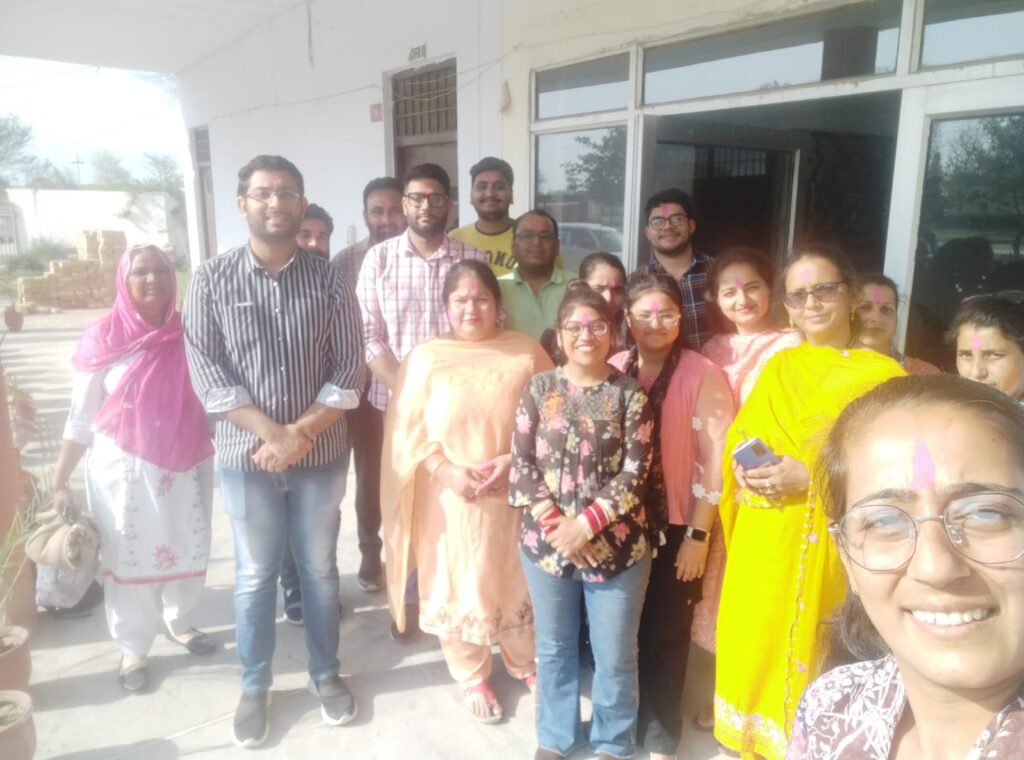
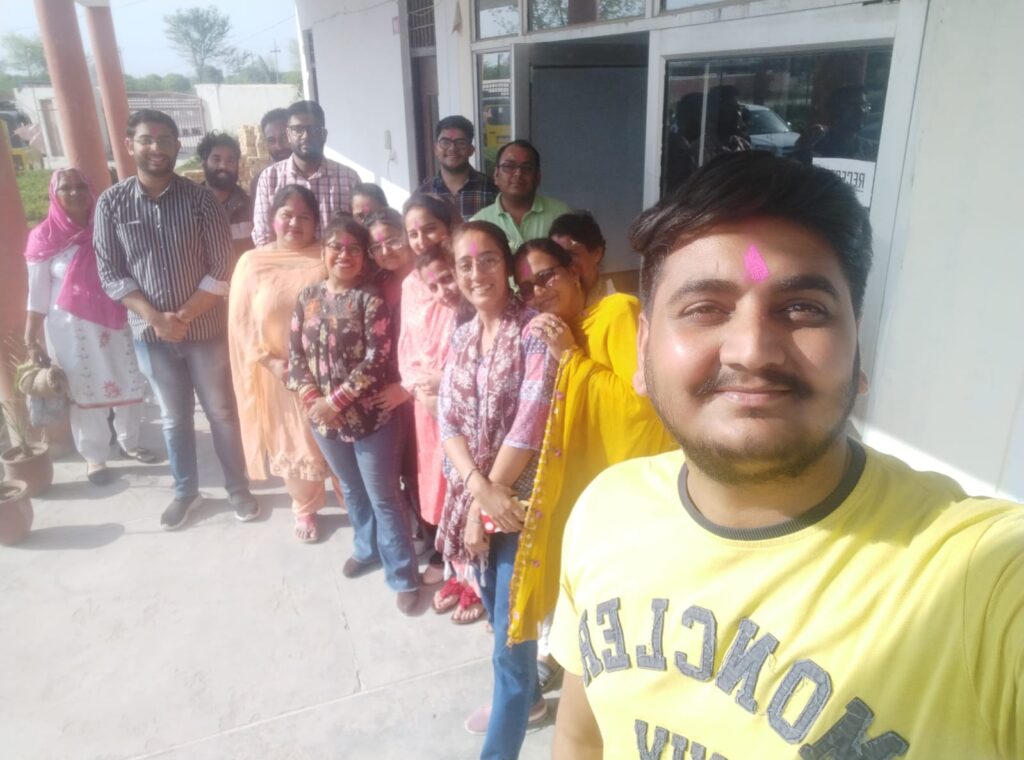
17) National Vaccination day
Each year on March 16th, National Immunization Day is observed. The purpose of National Immunization Day, also known as National Immunization Day, is to raise awareness about the necessity of vaccination. The 1st dose of Oral Polio vaccination was given in India on this day in 1995, March 16th. This year’s National Immunization Day is particularly significant because India is conducting the world’s largest vaccination drive against the CoVID-19 disease. The most efficient means of preventing highly contagious diseases is vaccination, sometimes known as immunisation. Immunisation is a proven technique for controlling and eradicating life threatening infectious diseases, according to the World Health Organization (WHO). Vaccination has an economic and social influence on the neighbourhood and at the national level, in addition to improving health and life expectancy.
The topic has a high probability of being asked as a Current Affairs Question in IAS Prelims and Mains.
History of Vaccination in India
In the nineteenth century, India pioneered modern immunizations. Over 51 years ago, India introduced the Bacille Calmette Guerin (BCG) vaccination to combat tuberculosis. In 1978, an enhanced programme was begun, which included Typhoid and DPT immunizations (Diphtheria, Pertussis, Tetanus). The same scheme was amended in 1985 and renamed the Universal Immunization Programme (UIP), Which was implemented in stages.
Facts about Vaccination in India
- In December 2014, UIP started Mission Indradhanush to improve the health of mothers and children that are not vaccinated.
- Mission Intensified Indradhanush was begun in 2019 with the goal of stepping up the immunisation campaign.
- Mission Intensified Indradhanush, by the year of 2030 intends to achieve the Sustainable Development Goal of eliminating avoidable child deaths.
18) Need for Women Empowerment
Almost every country, no matter how progressive has a history of ill-treating women. In other words, women from all over the world have been rebellious to reach the status they have today. While the western countries are still making progress, third world countries like India still lack behind in Women Empowerment.
In India, women empowerment is needed more than ever. India is amongst the countries which are not safe for women. There are various reasons for this. Firstly, women in India are in danger of honor killings. Their family thinks its right to take their lives if they bring shame to the reputation of their legacy.
How to Empower Women?
There are various ways in how one can empower women. The individuals and government must both come together to make it happen. Education for girls must be made compulsory so that women can become illiterate to make a life for themselves.
Women must be given equal opportunities in every field, irrespective of gender. Moreover, they must also be given equal pay. We can empower women by abolishing child marriage. Various programs must be held where they can be taught skills to fend for themselves in case they face financial crisis.
Most importantly, the shame of divorce and abuse must be thrown out of the window. Many women stay in abusive relationships because of the fear of society. Parents must teach their daughters it is okay to come home divorced rather than in a coffin.
19) Tree Plantation in AGI


20) Cleanliness Drive in College Campus
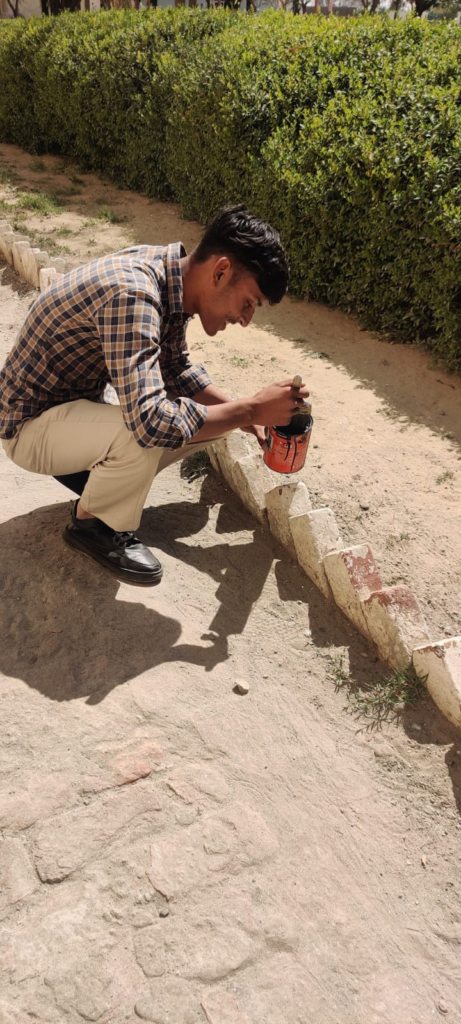
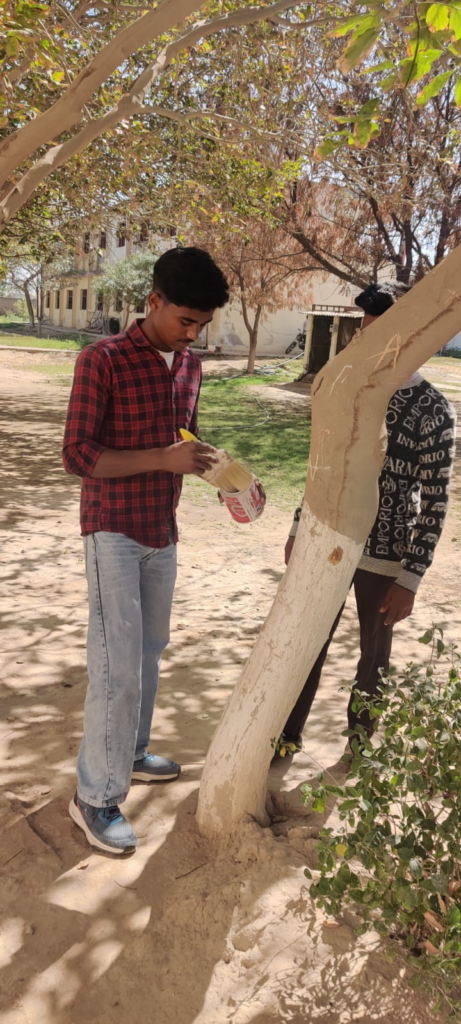
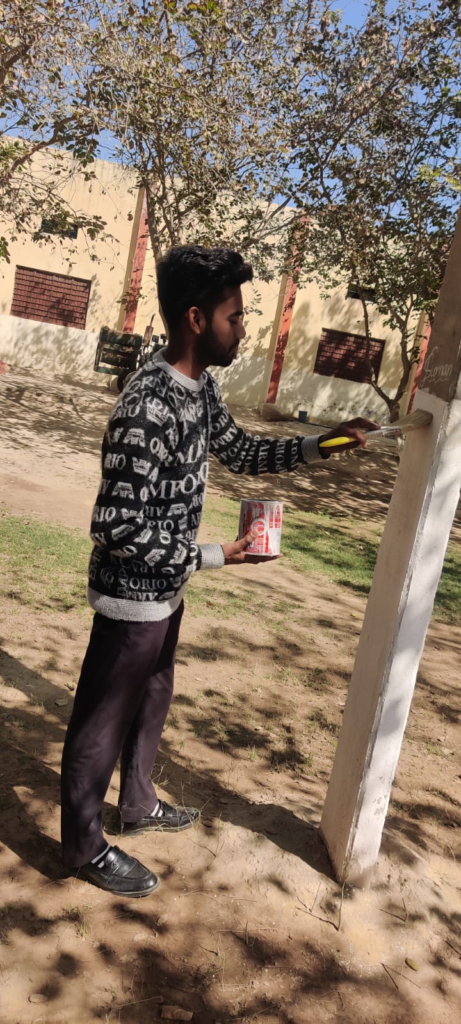
21) Student Visit the Orange Farm House
